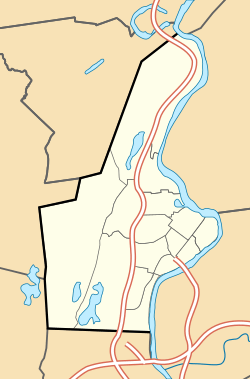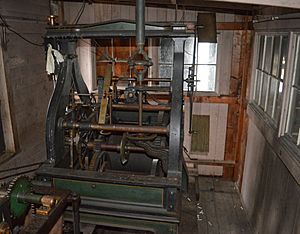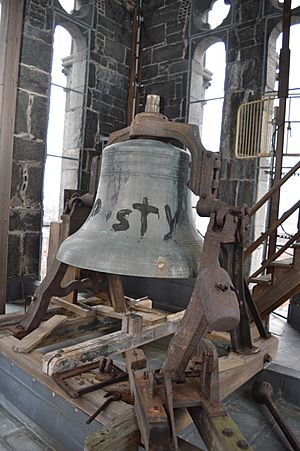Holyoke City Hall facts for kids
|
Holyoke City Hall
|
|
|
U.S. Historic district
Contributing property |
|
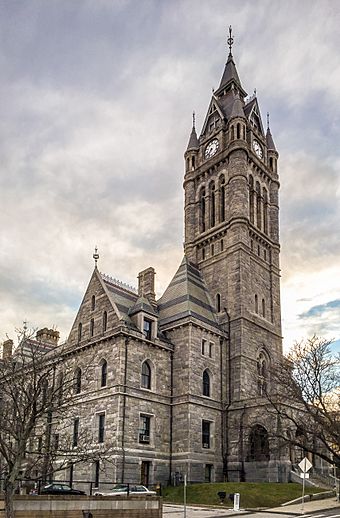
Holyoke City Hall
|
|
| Location | Holyoke, Massachusetts |
|---|---|
| Area | 0.95 acres |
| Built | 1871 |
| Architect | Atwood, C.B.; et al. |
| Architectural style | Gothic Revival |
| Part of | North High Street Historic District (ID92001725) |
| NRHP reference No. | 75000259 |
Quick facts for kids Significant dates |
|
| Added to NRHP | December 6, 1975 |
| Designated CP | December 24, 1992 |
Holyoke City Hall is a historic building in Holyoke, Massachusetts. It serves as the main office for the city's government. The building is located at 536 Dwight Street, at the corner of High Street and Dwight Street. It was also designed to be a public clock for the city's many factory workers.
Construction on the City Hall began in 1871. It was designed in the Gothic Revival style by architect Charles B. Atwood. There were some problems and delays during construction. Another architect, H. F. Kilburn, took over the design work in 1874. The building was finished two years later in 1876. It cost about $500,000 to build. Since then, it has been home to Holyoke's city offices.
Contents
Building Design and Features
Holyoke City Hall is a large stone building. It was built using granite from Monson. The building has a mostly rectangular shape. It also has parts that stick out on its long sides, like the arms of a cross. These are called transepts.
Gothic Revival Style
The building features pointed-arch windows. It also has strong supports called Gothic buttresses. These help hold up the building. The roof is mostly made of dark slate. It has stripes of red and green slate mixed in.
Tall Clock Tower
The main tower of City Hall is about 220 feet (67 meters) tall. It holds a large bell that weighs over 4,000 pounds (1,814 kg). The building was added to the National Register of Historic Places in 1975. This means it is an important historical site.
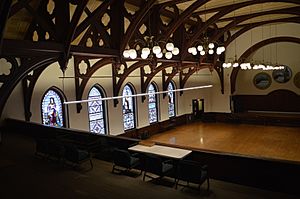
The Clock Mechanism
The clock tower has four faces made of special Belgium milk glass. These faces were originally blackwood with gold numbers, but they were hard to read. The clock's inner workings, called the movement, were installed in 1877. It is a Seth Thomas no. 14 model. This clock has all bronze parts. It is one of only three such clocks sold by the company in New England.
The huge 2.5-ton bell was made in 1875 by the Jones & Co. Troy Bell Foundry in Troy, New York. It has a special strike system. This is because the bell is on a different floor from the clock's main parts. In the 1930s, electric motors were added to help raise the clock's weights.
History of Holyoke City Hall
Holyoke City Hall has been used for many different things over the years.
Early Uses of the Building
In the late 1800s and early 1900s, the City Hall was a main meeting point for the Holyoke Street Railway. All the trolley lines met there. From 1876 to 1902, the building was also home to the Holyoke Public Library. The library later moved to its own building.
Besides city offices, the large ballroom on the second floor has been used for public events. It hosted school graduations, plays, dances, and parties for important visitors. From 1912 to 1926, the New York Philharmonic orchestra performed there every year. The Boston Symphony Orchestra also played there at least once.
Famous Visitors and Events
Many important people have visited Holyoke City Hall.
- In 1900, William Jennings Bryan, a famous speaker and presidential candidate, gave a speech there. Thousands of people came to hear him. He returned for another speech in 1902.
- Later in 1902, Mother Jones, a well-known labor organizer, spoke about a coal strike.
- In 1912, Woodrow Wilson, who would become president, held a campaign rally in the grand ballroom.
- In 1918, Franklin D. Roosevelt, who was then Assistant Secretary of the Navy, led a fundraiser for the American Red Cross in the hall. He would later become president.
After boxing became legal in Massachusetts, the grand hall was used for many boxing matches. In 1946, this space was changed into a basketball court. These changes were reversed in 1973 for the city's 100th birthday.
Temperance Fountain
On November 9, 1901, the Woman's Christian Temperance Union gave a special gift to the city. It was a Temperance fountain. This fountain was designed to match the Gothic style of City Hall. It was made of the same Monson granite. The fountain is still at the corner of Dwight and High Street today. It cost between $1,500 and $2,000 at the time. The fountain was meant to provide cool drinking water. It has three sayings carved into its sides, two from the Bible and one from Shakespeare.
|
O thou invisible spirit of wine, if |
I give waters in the wilderness, |
He whose spirit is without restraint |
Fire on the Roof
On April 29, 1930, a meeting of city leaders was interrupted. Several council members and city workers had to put out a fire on the building's roof. Strong winds had blown burning pieces from a large fire at a nearby lumber yard. Because many other fires were happening downtown, the public had to leave City Hall. The roof fire had to be put out by hand because there wasn't enough water pressure for fire hoses.
Recent History
Until the 1980s, the clock and its bell were often used for special events. One of the last times the bell was struck was on July 4, 1986. This was to celebrate the re-lighting of the Statue of Liberty's torch by President Reagan.
Clock Restoration
Over time, the clock needed more and more repairs. It often stopped working in the late 1900s. One big problem was that a ceiling above the bell fell in 1975. Birds also caused damage until a grate was put up. Mechanics even had to fight off about 1,500 blackbirds that tried to nest there in 1982. Also, the clock's gears were oiled with regular motor oil instead of special lubricant. This caused sticky residue to build up. Water also leaked into the wooden case for the clock's driveshaft, causing it to swell and warp.
The exact date the clock stopped working regularly is not known. After about 30 years of not working, the clock was fixed in the spring of 2018. A local expert who works on tall structures, Dave Cotton, and a professor from UMass, John Nelson, worked on it. They had worked on the clock at the Old Chapel before. On July 4, 2018, the clock started working again. It had new lights for its faces and fixed electrical systems. All the parts and time for the repair were donated. However, the bell still does not work, and there are no plans to fix it right now.
Recent Political Events
On September 29, 2018, Senator Elizabeth Warren held a meeting at City Hall. During this meeting, she first said she was thinking about running for president in 2020. She later officially announced her campaign in Lawrence, Massachusetts in February 2019.
 | William L. Dawson |
 | W. E. B. Du Bois |
 | Harry Belafonte |


